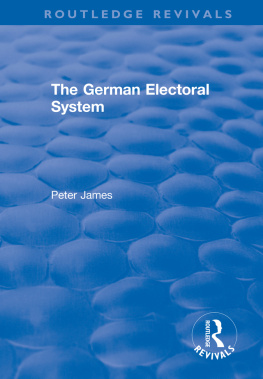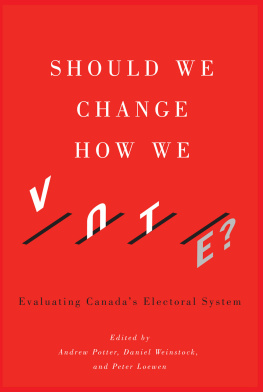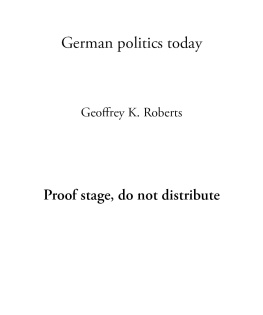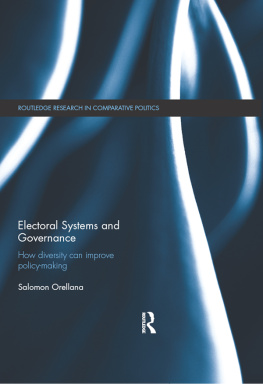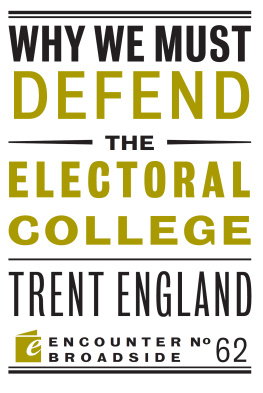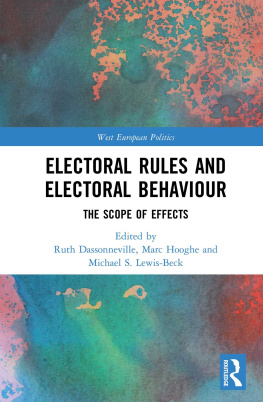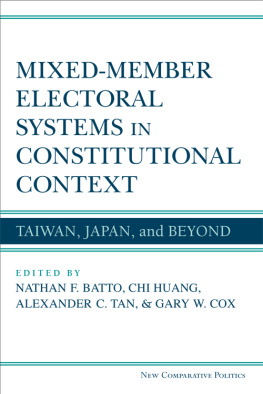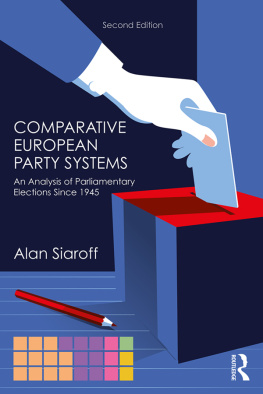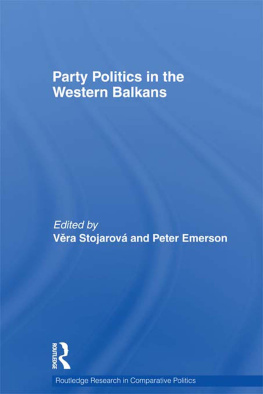First published 2003 by Ashgate Publishing
Reissued 2018 by Routledge
2 Park Square, Milton Park, Abingdon, Oxon OX14 4RN
711 Third Avenue, New York, NY 10017, USA
Routledge is an imprint of the Taylor and Francis Group, an informa business
Copyright Peter James 2003
All rights reserved. No part of this book may be reprinted or reproduced or utilised in any form or by any electronic, mechanical, or other means, now known or hereafter invented, including photocopying and recording, or in any information storage or retrieval system, without permission in writing from the publishers.
Notice:
Product or corporate names may be trademarks or registered trademarks, and are used only for identification and explanation without intent to infringe.
Publisher's Note
The publisher has gone to great lengths to ensure the quality of this reprint but points out that some imperfections in the original copies may be apparent.
Disclaimer
The publisher has made every effort to trace copyright holders and welcomes correspondence from those they have been unable to contact.
A Library of Congress record exists under LC control number: 2003056779
ISBN 13: 978-1-138-70955-3 (hbk)
ISBN 13: 978-1-315-19825-5 (ebk)
The Role of Elections
Free and fair elections are one of the cornerstones of a liberal parliamentary democracy. Any political system which makes some genuine attempt to establish a form of government which corresponds in any real degree to the wishes of the people being governed - preferably the majority of those people - must hold elections to ascertain the people's wishes. The basic function of an election in a democratic society is to provide a means by which the will of the people can be established, recorded and used to elect a body to govern on behalf of the people. That body should represent the various trends of political opinion.
Democracy and elections are closely interwoven. An election is the basis upon which democratic, constitutional procedure rests; its purpose is to offer a mandate to govern for a limited period of time. Without democracy there is no election and without an election no democracy, although an election per se does not of course guarantee democracy. There must be an acceptance of the principle of pluralism, so that the majority does not abuse the minority. Power must not be abused.
However, it must be recognised that politics is, fundamentally, a battle for power. On the day of an election that power is transferred briefly to the voters. The act of participation by the voter allows him or her to take part in the decision-making process. Intentional non-participation (abstention) is also a way of influencing the situation, because, of course, turnout at an election can affect the result. The politicians know this and they know too that, if they want to be re-elected, they must take the ordinary citizens' opinions and wishes into consideration, since it is the voters who play a key role in the distribution of that power.
In this way it is essential for politicians to grasp the fact that any power they are granted by the people is for a limited time only. In any democratic system today's government can become tomorrow's Opposition. Political parties should never forget that any democratically elected government has been elected to rule on behalf of all the people, with their consent, and for a restricted period. A strict check is kept on any elected government, not only by the parliamentary body chosen at the original election, but also by the voters, who, if dissatisfied, have the power to change things at the next election.
Elections not only give citizens the right to pass judgement and to express their political views, they also legitimise power and keep a check on the people's political representatives. Whilst in any democratic system the majority view prevails, it is a fundamental principle in a liberal parliamentary democracy that the minority must not be suppressed or exploited in any way. In a political system based on human rights and the rule of law, minorities and minority views must be respected and protected at all times. The basic functions and essential characteristics of elections include that of representation. The deputies, or members of parliament, who have been elected must strive to represent all the voters they represent, regardless of how they voted. In this way important aspects, namely those of competition and potential changes in democratic power, are guaranteed by the election process.
When it comes to the method of voting adopted in a constitutional democracy, an electoral system can be viewed as a way of translating the people's votes into seats in parliament, or in whatever body is chosen to represent the people. Five principles can be identified. Firstly, an electoral system should provide a parliament that reflects the main trends of opinion within the electorate. Secondly, it should provide government based on the wishes of the electorate. Thirdly, it should provide for the election of representatives who are qualified for government and who are capable of forming meaningful links between themselves and the people they represent. Fourthly, it should provide a situation which favours the formation of a government capable of governing effectively. Fifthly, it could be argued that ideally an electoral system should also provide an equilibrium of social forces which simultaneously reconcile unity and diversity. These five principles need to be taken together, so that no single consideration can completely override the others.
In his book on empirical electoral research, Dieter Roth, Head of the German electoral research institute, Forschungsgruppe Wahlen in Mannheim, states that fundamentally electoral systems have two main aims: firstly, the production of workable government majorities, and secondly, the establishment of a parliament which is as accurate a reflection as possible of society,
All this gives rise to a key question: do electoral systems shape political systems or vice versa? Some eminent experts, for example the German political scientist Karl-Rudolf Korte, view the electoral system as being not only central to the power struggle in politics but also as being influenced by the structure of the party system, the stability of the governmental system and political culture. The type of political parties which emerge and the nature of a country's party system can, and will, influence its electoral system.
So, as far as this fundamental question is concerned, there is clearly some interaction in a two-way process.
There are of course other factors in a country's political system which also play a part in this respect. For example, in postwar Germany the introduction of a constructive vote of no confidence in the 1949 constitution made a substantial contribution to political stability, after the chaotic political circumstances of the Weimar Republic. Nevertheless the electoral system itself, via the way in which it acts as a mechanism for allocating parliamentary seats, can influence the way the results of an election are interpreted, and this in turn may affect the nature and development of the party system. For an example of the difference that the application of a different electoral system to the same set of results can make, see .

